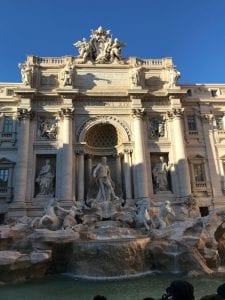My goal by the end of my study abroad program is to not be recognized as an American when I’m walking down the street.
I get it, it’s pretty obvious I’m American when I’m walking in a big group of friends and we’re all talking loudly in English about American stuff.
But even when I’m alone, people will call out to me constantly, “Hello, hello, do you want a souvenir?” “Come in! Sit down at this restaurant!” “Hello, hello how are you today?” “Do you want to buy this?”
Being heckled to buy a souvenir in your own neighborhood just feels wrong.
How am I supposed to see Rome as home when it treats me like I’m a stranger, an outsider, an intruder?
And what about me seems so American?!
I’ve never felt so annoyed with being labeled as a tourist and I’ve never felt so annoying. As an American, I am a walking stereotype. And when you layer on tourist to the American label, that stereotype is just augmented. A bit of your own individuality seems to be obscured by this big ole stereotype.
And I get it–being an American in Rome is pretty obvious. When I’m walking down the street or riding the metro, I can always pick out the loud, obnoxious group as Americans. People think Italians are loud, but honestly whoever said that is either an American that has no self-awareness or someone who has never met an American.
Being in Rome, my perspective towards America has completely shifted. Since I’m not living in the U.S. for months, I’m able to adopt more of an outsider’s perspective while talking to Italians and other people not from the U.S. about what they think it’s like.
The Italian student, Elisa, who lives with me in my apartment says that Italians often question how Americans elected Trump as our president. That reflects so poorly on us. We chose to have someone like that in office, and he’s inspiring fear in the entire world because his decisions impact the entire world. Our decision, as Americans, to elect Trump has a ripple effect on the entire world that we didn’t even notice. I feel like we’re oftentimes in our own little bubble and don’t even think about what’s going on in the cluster of countries on the other side of the Atlantic. A lot of Europeans think this too. And it’s a valid point!
In my Cross-Cultural Psychology class, my professor played a clip from the Jimmy Kimmel show in which people from the show went around New York with a map and asked Americans to point out and name one country. Just one country. Everyone pointed out Africa, but then were reminded that Africa is a continent, not a country. They couldn’t name (they weren’t asked to point, just name) a single country in Africa. When someone was asked where the U.S. was, someone pointed to Russia and said they thought that was America because it was the biggest. Yikes!
I really didn’t realize how much power America had in the world until I came to Italy. We monopolize the entertainment industry–Italians pretty much solely listen to American music and watch American movies. Elisa and I share a lot of the same music tastes as well as favorite shows and movies. Live music played on the cobblestone streets of Rome are always American music, sung in English. And many Italians associate celebrities with Americans. One of our waiters called my friend Rhianna, for example. Many Italians will ask us if we’ve met celebrities because many will assume the entire United States is like L.A. and New York (side note: Italians are absolutely enthralled by New York. Whenever I ask an Italian where in the U.S. they want to visit, they always say New York. And they are obsessed with the song “New York” by Alicia Keys!).
Entertainment serves as a medium for ideas and values to be transmitted. So, because we have such a hold on the entertainment industry, our ideas and values are spread farther and faster than any other country. That’s power.
Elisa said that so many things from the U.S. influence Italy. The #metoo movement moved to Europe a la the entertainment industry and social media, for example. American ideas and values are so palpable because they are made so clear and reachable through the media.
At the same time, American ideals are filtered through media, particularly TV, so of course all the not so great parts of America are showcased through media and that’s the image the rest of the world gets. Most people see Americans as people who get crazy drunk and party all the time because that’s what is shown on TV. I can’t tell you how many times Italians, especially the IES staff, have told us that Italians drink for pleasure and to complement their food rather than to get drunk and party, unlike the U.S. So, while the media can be a tool for good, it can also curate a certain image of groups of people that aren’t so great (and aren’t always accurate either).
I also didn’t realize how powerful speaking English is, and how lucky we are to have it as our native language, especially since it’s so hard to learn! Elisa said that from a very early age, the English language is so emphasized in Italy because it is such a powerful language. Every kid is required to learn English starting from just one year old, and everyone I’ve met in Italy speaks at least a little English. And most Italians speak English very well! English is really seen as the universal language–it is the language I see in all airports in Europe.
Meanwhile, there are people in the States arguing that we shouldn’t learn Spanish because people coming into America should learn “the” language, “our” language: English. Italy has the opposite idea. Elisa said that it’s important for Italians to know other languages to accommodate for all the immigrants and refugees coming into the country.
It’s really hard that I don’t speak Italian. I have to make Italians cater to me in their own space, in their own home, by speaking English because I don’t understand Italian yet. I think this just furthers the idea of American ethnocentrism. When I speak English, they can’t see my desire to connect with them or my love and appreciation for Italian language and culture. All they see is a dumb American wanting yet another person to cater to them, to make their life easier and more comfortable by reaching out to them in their own language.
In my Cross-Cultural Psych class, we learned that the biggest form of integration and feeling like you belong in a culture is learning the language. I cannot wait until I know enough Italian to use it and make progress towards integration. I hate that I have to revert to English at the point I’m at.
I can be aware of my Americanness, but I can’t shake it. Culture really does influence and shape you.
When I run to class with my North Face backpack bopping up and down, weaving between slow walkers, I’m obviously American. Italians take things slow and don’t care if they’re late because they’re all about enjoying and savoring the moment.They walk so slow, but they enjoy their walks.
When I ask for something to go (in Italy they say “to take away” because that’s how they say it in England and they speak British English), I’m obviously American. Again, Italians are all about living in the moment and enjoying every little thing. Asking for something to go is kind of insulting because it implies that you just want to eat the food for the sake of eating food vs. actually enjoying it, and you don’t appreciate the ambiance of the café or little restaurant enough to take the time to sit down and enjoy it. It implies that you’re just using them for food vs. the experience. Food is an experience here; you can’t separate the two.
When I’m standing in front of a metro kiosk, sifting through the Italian words that blur together on the screen, trying to get a ticket while people are budging me to get their ticket because they’re tired of waiting, I’m obviously American. But practice makes perfect and I’m getting the hang of it!
When I hesitate on the curbside waiting to cross the street when there’s no crosswalk, I’m obviously American. I’m getting better at this though–I either find an Italian and follow them at a weirdly close distance as they cross the street because I know that since they’re used to this, the route they’re about to take is safe, or I just go for it and risk it and walk. I feel like I’m risking my life every time I do it, but I’m still alive so what the hey.
I really want to be absorbed in this culture, but there is naturally a degree of separation here. Every time I stop to take a few too many pictures of a monument Italians pass everyday, or an Italian has to speak to me in English because that’s the only way I can communicate with them, I feel like a leech sucking up their culture and not offering anything in return.
I don’t want to use Rome for its culture; I want to give something back as well. I want this to be a cultural exchange vs. Rome enriching me with knowledge and giving me a life-changing experience, and then just going home and Rome being the way it always is and me having done absolutely nothing to change it while it gave me so much without even trying to. This is an incredible opportunity and the last thing I want to do is be selfish about it.
I’m not sure how to give back in this way quite yet, but because being seen as a tourist bothers me SO much, I’ve been taking active steps to cross the threshold between tourist and non-tourist. I can never be a local, and I’m not going to assume Italian culture as my own because it isn’t my culture, but I do want to soak myself in it for the time I’m here instead of standing at the outskirts as a tourist too scared to dive in.
Whenever I go to my internship, I don’t feel like a tourist. This is because I mimic the workday of an Italian; I hop on the metro and go to work at an Italian preschool where they only speak Italian. Because the kids don’t speak English, I’m forced to work on my Italian, which makes me feel like I’m contributing and trying and maybe even giving something back, because I’m teaching the kids about English and American culture in return.
The kids are so little that they don’t understand I don’t speak Italian, so they oftentimes treat me the same as they would an Italian, which is so refreshing. They do laugh and make fun of America, and one kid thought New York and America is one in the same, like the entire country of America is New York. But at least they’re not accommodating me just because I’m American. I appreciate that. I appreciate being treated like a peer rather than a tourist.
When I stop at a cafe for a cappuccino after class, I don’t feel like a tourist. When I slow down, sit alone, and just breathe, I don’t feel like a tourist. In the U.S., I don’t think I’ve ever gotten a coffee simply for the sake of getting a coffee. I’ve always gotten a coffee as something to catch up with a friend over, or to supplement studying. I’ve never just sat there and sipped and breathed. And I honestly think that would be weird to do in the U.S., unfortunately. At least I would feel weird about it.
When I wander along the cobblestone streets alone, I don’t feel like a tourist. I actually love exploring Rome alone. As much as I love exploring with my friends, when I’m walking around with them the city is filtered in a way. What we see together becomes our experience, versus my experience. And don’t get me wrong, that’s special and wonderful and I do love it. But there’s just something magical about being independent and alone and free, with just me and the city and that’s it. When I’m with friends, I’m always absorbed in our conversations, getting distracted and swept up in the energy of the group. But when that’s taken away, it’s just me and Rome. I notice the little details. I feel the energy of the city. I feel more of a connection with the place I’m in.

Stopping for some gelato and to listen to street musicians while on an afternoon of exploring the city solo.
And I feel like me being comfortable with the unfamiliarity and uncertainty of different parts of the city is a huge milestone. It’s a sign that I’m seeing Rome as home rather than a big, scary unknown place. At home I go for walks alllll the time; it’s my favorite thing to do. But when I first got to Rome, I made Elisa walk me to school because I was way too scared to go alone. I didn’t walk alone until maybe the second week. But today, I purposely got lost on the metro just to explore and roam, and it felt like a normal stroll in the neighborhood. I visited my friend from Whitman in Germany this past weekend, and hopped on a bus to Austria alone while she was in class. I couldn’t even walk to class alone before, but now I’m crossing into new countries alone. Noticing that kind of growth has been really cool!
Culture shock is real and hard, but in a way I didn’t expect. I thought that I’d get annoyed with parts of Italian culture and want to go home, but it’s literally been the complete opposite. There’s a point in the culture shock cycle where you either integrate your identities or reject one culture for the other. I feel like I’m being so cynical about America at this point and most definitely am choosing Italy over America. But I need to learn to see the good in America and embrace the American parts of me that make me who I am, while also integrating pieces of Italian culture that I embrace and adore. It’s a process.
Today I was telling Elisa about the Pacific Northwest and Northern California; I was showing her photos and she seemed so amazed at the beauty, and it made me realize how much I really do love pieces of America.
We also talked about feminism, and how that’s totally rejected in Italy because the suffix “-ism” has such political connotations (communism, fascism, etc.), so that made me realize that the U.S. is doing some things right–although Trump isn’t on the same page, I’m grateful to have participated in Women’s Marches and been able to stand up for gender equality. Italy is not nearly as progressive when it comes to gender and LGBTQ+ rights (especially since it’s a culture seeping in Catholicism), and I need to remember how fortunate we are in America to be making steps towards a more equitable society (obviously we’re not there yet, but we’re strides ahead of Italy and at least Elisa seems to be impressed).
I need to balance my love for Italy with my love for aspects of the U.S., treading the line between integration and completely dismissing home home. Remembering where I come from and not losing parts of that is incredibly important.

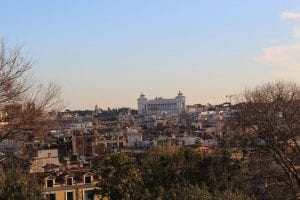


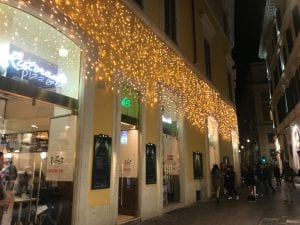
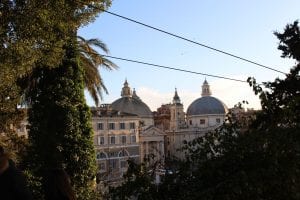

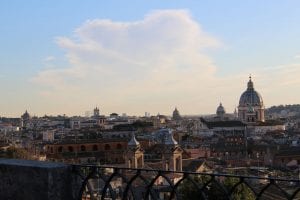

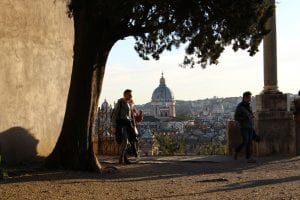
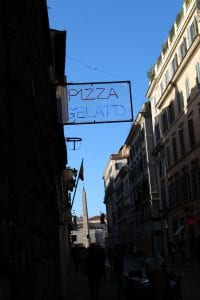
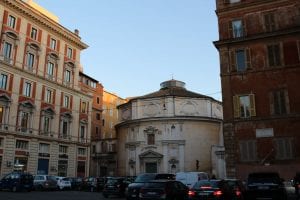

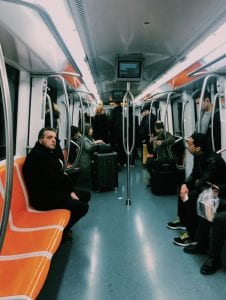
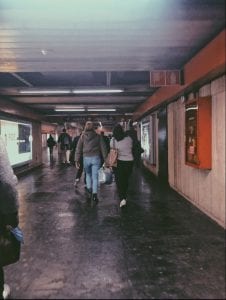




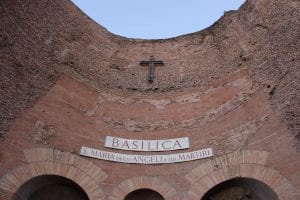

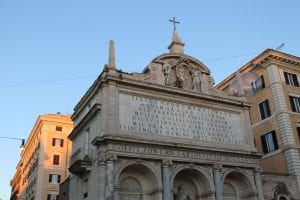

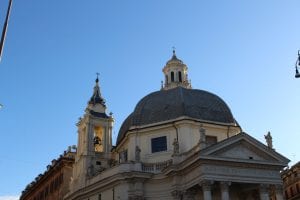
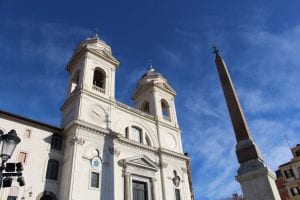
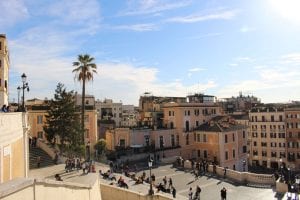

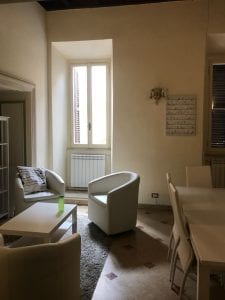
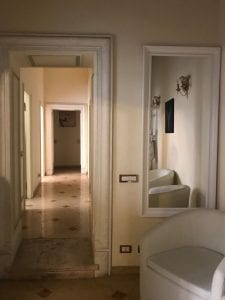

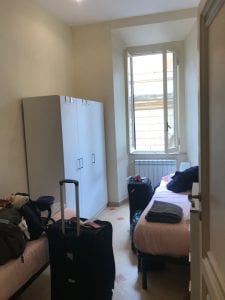
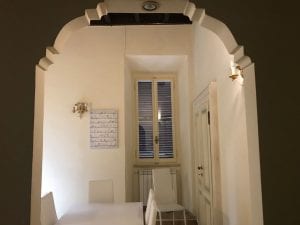
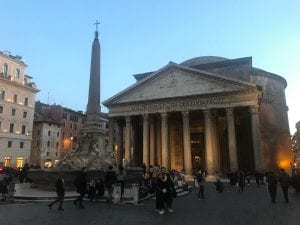
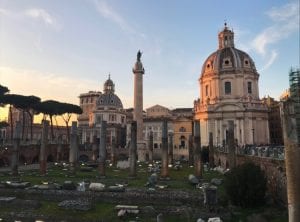
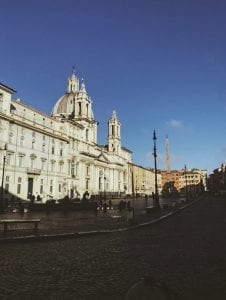


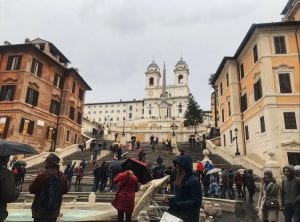

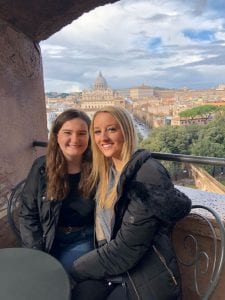

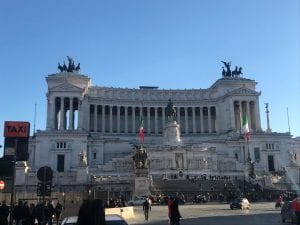

 .
. 
